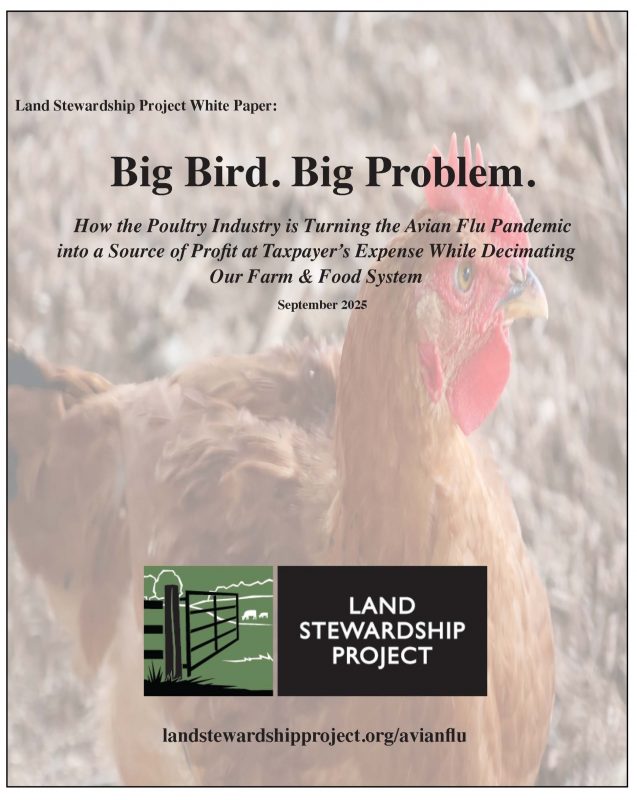LEWISTON, Minn. — Last week’s announcement that a deadly strain of avian influenza has reemerged in Minnesota raises renewed questions about the role large, industrialized poultry operations play in propagating this disease, say authors of a new white paper published by the Land Stewardship Project (LSP). “Big Bird. Big Problem: How the Poultry Industry is Turning the Avian Flu Pandemic into a Source of Profit at Taxpayer’s Expense While Decimating Our Farm & Food System” (landstewardshipproject.org/avianflu) examines what questions need to be answered if we are to put an end to a seemingly endless cycle of outbreaks, mass euthanasia, pay-outs and inflated food prices. The paper argues that this moment of crisis also offers a significant opportunity to create a food and farming system that is not constantly on the verge of disaster.
“There is increasing scientific evidence that factory farms are in fact the perfect environment for a virus like avian flu to survive, thrive and increase in virulence,” said Doug Nopar, a Winona County, Minn., farmer and a member of LSP’s Avian Flu Steering Committee. “Meanwhile, the strategies being used by the government thus far — pay producers to kill off entire flocks while subsidizing the construction of even larger CAFOs — are perpetuating the problem.”
Minnesota’s latest outbreak of highly pathogenic HFN1 avian influenza was first detected in a commercial turkey operation in Minnesota’s Redwood County, according to a press release issued by the Minnesota Board of Animal Health on Sept. 17. A total of 20,000 birds were impacted by the initial Redwood County outbreak, which was the first flare-up of the illness in Minnesota since April 23. However, in just a seven-day period, three more commercial Minnesota turkey flocks have tested positive for avian flu, resulting in a total of 80,400 birds that have been impacted in the state as of Sept. 23, according to the USDA’s Animal and Plant Health Inspection Service. Minnesota is the nation’s largest turkey producer.
“This detection resets Minnesota’s response teams and will draw responders back into the fight against avian influenza this fall,” announced the Board of Animal Health in a press release.
In February 2022, U.S. poultry operations started reporting outbreaks of a new H5N1 avian flu virus. What sets this virus apart from other illnesses that have struck livestock over the years is the speed with which it spreads, as well as its virulence. It’s a highly pathogenic avian influenza virus, which means once a bird contracts it, it results in virtually a 100% fatality rate. And once a few birds are infected, it spreads quickly to the rest of the flock.
Once H5N1 was identified in those first flocks in 2022, the virus raced through large-scale concentrated animal feeding operations (CAFOs) in the U.S. at a staggering rate. And because the main solution promoted by the industry, land grant scientists and government officials is to destroy entire flocks once the virus shows up in a few birds, the bird death rate — directly from the virus itself and as a result of euthanasia — has skyrocketed. Repeated outbreaks of H5N1 have cost taxpayers hundreds of millions of dollars and resulted in higher prices at the grocery store, all while poultry companies enjoy massive profits.
The industry has repeatedly claimed that CAFOs that house tens of thousands of birds in close quarters are the best, most biosecure way to raise poultry, and that this virulent form of bird flu is the rare result of such security features being breached by outside forces that are beyond their control. It’s been suggested that two of these forces are wild waterfowl and farming operations that raise poultry in pasture-based and otherwise “backyard” or non-confined situations.
Studies have shown how avian flu, even when introduced by wild swans, for example, doesn’t become deadly until it has an opportunity to incubate and spread in large scale commercial operations. Of the 39 times a low pathogenic avian influenza strain evolved into a highly pathogenic avian influenza strain between 1959 and 2015, 37 of those jumps were reported in commercial poultry production systems, according to a study in the journal Frontiers in Veterinary Medicine. Evolutionary ecologist Rob Wallace says that the CAFO production system makes poultry not only food for humans, but “food for flu.”
“Big Ag has done a great job of insulating the typical American eater from the negative impacts of an industrialized approach to producing food, but now the chickens have come home to roost, so to speak, when it comes to avian flu,” said Sean Carroll, LSP’s policy director. “We should not accept this as an inevitable way of doing business. These outbreaks provide an opportunity to reexamine what has made this disease so devastating and what we can do to step off this seemingly endless, and costly, treadmill.”
The LSP white paper proposes several steps for creating a more resilient poultry production infrastructure, including: ending the subsidization of the current CAFO system, directing public funds to a more regenerative system, supporting a localized and distributed processing system, and funding land grant research that gets at the cause of the problem and sustainable ways of resolving it.
“Farmers throughout Minnesota and the Midwest have shown they can raise poultry in regenerative systems that don’t serve as vectors for deadly forms of avian flu,” said Nopar. “It’s time we stopped propping up an inherently flawed way of producing food and developed a truly resilient and accountable farm and food system.”
“Big Bird. Big Problem: How the Poultry Industry is Turning the Avian Flu Pandemic into a Source of Profit at Taxpayer’s Expense While Decimating Our Farm & Food System” is available at landstewardshipproject.org/avianflu or by calling 612-816-9342.
-30-
The Land Stewardship Project (LSP) is a nonprofit organization dedicated to fostering an ethic of stewardship for farmland, promoting sustainable agriculture and developing healthy communities in the food and farming system. LSP has offices in the Minnesota communities of Montevideo, Lewiston and South Minneapolis. More information is available at landstewardshipproject.org.
